
Journalism is no more in a survival mode today than it was 52 years ago when Louis Lyons and my Nieman classmates worried about how a compliant and objective press was helping Joe McCarthy savage the body politic.
Attitude? Anyone recall Westbrook Pegler excoriating Eleanor Roosevelt and her husband? Or Colonel Robert McCormick’s Chicago Tribune and the Hearst newspapers on the New Deal? A colleague at Columbia University who worked for the Journal-American in New York told me that the Chief, as William Randolph Hearst was known, instructed his staffers that Roosevelt’s New Deal was to be called the Raw Deal.
Journalism survived them, as it did the partisan press, yellow journalism, and fiction-writing journalists to whom the reporter’s notebook was incentive to invention. (Leaf through Ben Hecht’s tribute to Chicago-style journalism in his novel, “Gaily, Gaily.”) I just learned that St. Clair McKelway’s lead I’d acclaimed in edition after edition of “News Reporting and Writing,” my journalism textbook—“What price Glory? Two eyes, two legs an arm—$12 a month.”—about a disabled World War I veteran’s pension from an ungrateful nation began a story that is well-written hokum.
If you take time to look at what journalists are doing these days—as I’ve done to gather material for my book’s 10th edition—you’d be encouraged. Here is a small sampling of what I found:
A nine-month investigation by Miles Moffeit and Amy Herdy of The Denver Post into how the military handles domestic violence found “sexual and domestic violence to be widespread in the armed services” and that the “military’s unique justice system protects abusers while punishing the victims ….”
Ronnie Greene’s investigation for The Miami Herald of labor contractors documented the exploitation of Mexican and black laborers.
The digging of Anna Werner and David Raziq for KHOU in Houston exposed flawed lab tests in Harris County, which sends more men and women to death row than any county in the nation.
Eric Newhouse of the Great Falls (Montana) Tribune followed his Pulitzer Prize series on the problems alcoholism causes in the community with a series on the lack of care for troubled youths. He told me, “My job is to amplify the voices of those who often go unheard.”
UPI reporter Mark Benjamin, now the investigations editor, examined the medical treatment of soldiers returning from Iraq and uncovered delays—some months long—in treatment as well as problems involving mental health, including suicide linked to malaria medications.
New York Times’ reporter David Cay Johnston traveled to farm country to check President Bush’s assertion that “to keep farms in the family we are going to get rid of the death tax.” He found fearful farmers, evidence that Bush’s warning had taken root. But how many farms had been lost? “It’s a myth,” he quoted an Iowa State University farm economist. “He had searched far and wide but had never found a case in which a farm was lost because of estate taxes,” Johnston wrote.
Juxtapose this with Jack Wilson’s frustration when he covered Barry Goldwater’s 1964 presidential campaign for The Des Moines Register and Tribune. “We could not give an accurate picture of the campaign within the limits of what you might call straight news reporting,” Wilson told me. “We could not, without editorializing, tell the readers that Goldwater was not getting a strong reaction from the crowds, that he was in some cases boring them. We couldn’t say that some of what he said didn’t make sense in terms of being bad logic expressed in sentences that didn’t say anything.”
Are there problems? Obviously: We have a failing educational system in which college freshmen work at the level of yesteryear’s high-school juniors. (The ACT Assessment, which tests high school seniors, reports 22 percent are ready for college-level English, mathematics and science.) Cash-hungry media owners find that paranoid journalism sells well. The stream of well-prepared young men and women from journalism programs—about three-fourths of new hires are journalism graduates—is thinning, as are the ranks of newsroom veterans who had been hired to mentor journalism students but now cannot meet the PhD requirement.
Those experienced journalists are being replaced by communications-schooled men and women who have a hard time understanding why journalism students are obligated to find kinship with the prophets, as Abraham Heschel, the Old Testament historian, described them. They were, he wrote, “intent on intensifying responsibility” and “impatient of excuse, contemptuous of pretense and self-pity.” They were people who “felt fiercely” and were “attuned to a cry imperceptible to others.”
The media reflect our culture. We change; it will change.
Melvin Mencher, a 1953 Nieman Fellow, is professor emeritus at The Graduate School of Journalism at Columbia University and author of “News Reporting and Writing,” soon to be published in its 10th edition.


